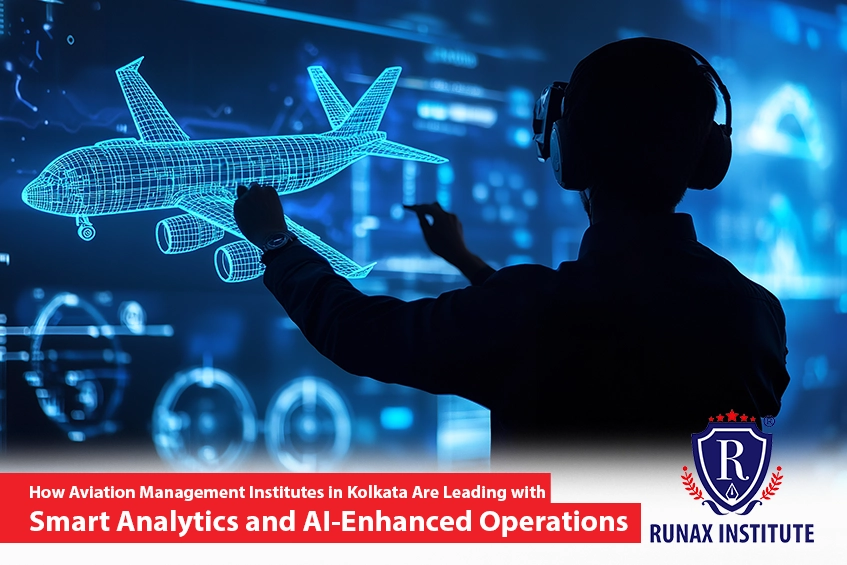Introduction
These days, airports are more than just places where aircraft land and take off. They have transformed into complex, data-driven ecosystems where efficiency, passenger satisfaction, and security hinge on precision analytics and AI-powered systems. For aspiring professionals, navigating these dynamics requires more than traditional training. For this reason, the learning curve is being redefined by Aviation Management Institutes in Kolkata.
These institutes combine technical mastery with real-world applications, offering AI-powered aviation training, predictive modelling, and a smart airport operations curriculum that prepares students for high-stakes decision-making. From forecasting flight delays to optimising passenger flows, graduates leave as strategic thinkers capable of running modern airports efficiently.
Ignoring these advancements could mean falling behind in an industry where seconds matter, luggage misrouting can cause chaos, and passenger experiences dictate airline reputation. By embracing AI, analytics, and digital aviation operations, students gain not only operational proficiency but also the foresight to innovate.
Please keep reading to explore how Kolkata’s aviation institutes are turning classrooms into high-tech command centres, equipping students with skills that make them indispensable in today’s aviation landscape.
Predictive Flight Operations: Forecasting Delays & Demand
Predicting flight schedules might seem like juggling knives, but aviation management colleges in Kolkata train students to handle it with AI precision. Courses now integrate predictive analytics in aviation institutes, allowing students to forecast delays, model passenger demand, and optimise scheduling using machine learning.
Students work with real-time data feeds, weather forecasts, and booking patterns, feeding them into regression models, neural networks, and time-series analytics. These tools let them simulate disruptions, such as sudden weather changes or air traffic congestion, and adjust flight slots with surgical accuracy.
Through machine learning flight scheduling, students learn to anticipate peak traffic, optimise crew assignments, and plan turnaround times efficiently. Labs provide sandbox environments where they can test models without real-world risks.
Graduates from these programs don’t just follow schedules—they predict disruptions, manage dynamic resources, and proactively communicate contingency plans. This AI-enhanced capability ensures smoother airport operations and improved passenger satisfaction, giving them a strategic edge over traditional operators.
AI-Driven Lounge & Passenger Flow Analytics
Passenger comfort goes beyond seating and refreshments. Smart airport operations curriculum in Kolkata now includes lounge occupancy analytics in the aviation course, equipping students to monitor, forecast, and optimise lounge usage.
Using occupancy sensors and real-time dashboards, students learn to adjust staffing levels, reorder inventory, and redesign layouts to enhance guest experiences. Predictive triggers alert them when lounges are nearing capacity, helping prevent bottlenecks.
Training also covers passenger flow forecasting aviation courses, where students analyse patterns from check-in to boarding gates. Insights allow staff deployment to match traffic surges, ensuring security and hospitality converge seamlessly.
By combining AI dashboards and sensor data, learners understand behavioural patterns and operational efficiencies. The result? Graduates who can run airport lounges and passenger services that feel effortless while being backed by data-driven intelligence.
Smart Airport Infrastructure & Automation Systems
Modern airports demand more than human oversight. Kolkata institutes teach sensor-based airport operations training, biometric check-in technology training, and automated baggage routing analytics to ensure seamless operations.
Students design and operate systems where passengers check in via contactless kiosks, luggage moves through automated conveyor systems, and gate assignments adjust dynamically to delays. Smart airport infrastructure training ensures learners understand both the technology and its practical application.
Hands-on labs allow students to experiment with sensor-integrated gates, automated baggage paths, and IoT-linked surveillance systems. These experiences enable graduates to optimise throughput while maintaining passenger safety and comfort.
This combination of hardware, software, and process knowledge ensures students aren’t just theorists—they become implementers capable of running complex, automated airport environments efficiently.
Data Privacy, Compliance & Ethics in Analytics
AI and analytics come with responsibility. Kolkata’s aviation programs emphasise data privacy in aviation management courses and ethical AI in aviation management, teaching students to anonymise data, comply with regulatory requirements, and secure sensitive passenger information.
Students simulate breach response protocols, learn about India’s privacy norms, and explore ethical frameworks for AI deployment. Modules highlight how misuse of AI or negligence in data handling can compromise safety, customer trust, and regulatory compliance.
Ethical and legal training ensures graduates handle predictive models, dashboards, and operational analytics responsibly. The emphasis on ethical AI equips them with the judgment to balance efficiency, passenger privacy, and regulatory adherence—a must-have in modern airport management.
Simulation-Based AI Training & Real-World Internships
Theory without application is hollow. Kolkata institutes merge classroom learning with AI aviation internships, giving students a chance to deploy models in real airport operations. Labs simulate control centres where trainees manage flights, baggage, and passenger flows in real time.
Students test AI dashboards for aviation students, adjusting schedules, predicting bottlenecks, and making data-driven operational decisions. They also work with partner airlines to implement digital aviation operations strategies under supervision, bridging the gap between classroom theory and real-world execution.
These experiences let students translate predictive insights into tangible action, enhancing decision-making skills, operational foresight, and confidence under pressure. The exposure ensures graduates are workforce-ready from day one.
Future-Ready Skills: From AI to Aviation Leadership
Graduates of Aviation Management Institutes in Kolkata don’t just manage operations—they lead transformations. By integrating predictive analytics, sensor-based airport operations training, and AI-powered aviation training, students emerge capable of strategic decision-making.
Courses emphasise leadership skills, data interpretation, and stakeholder communication. Students learn to design interventions, forecast operational trends, and implement smart airport infrastructure improvements. They graduate with a blend of technical know-how and managerial insight, prepared for roles in airlines, airports, and aviation consulting firms.
The curriculum ensures they’re not just operators—they’re innovators shaping the future of airports with AI, data analytics, and smart infrastructure, keeping Kolkata at the forefront of aviation excellence.
Conclusion
Aviation Management Institutes in Kolkata are redefining aviation education. By embedding predictive analytics in aviation institutes, AI-powered aviation training, and smart airport operations curriculum, students gain both operational mastery and strategic foresight.
From forecasting flight delays and optimising lounge occupancy to deploying automated baggage routing analytics and adhering to data privacy in aviation management courses, Kolkata’s institutes equip graduates with future-ready skills. Real-world internships and simulation labs bridge theory and practice, producing professionals capable of leading AI-enhanced airport operations.
This approach ensures students graduate not just as managers but as leaders who can navigate complex, dynamic airport environments, enhancing efficiency, safety, and passenger satisfaction while driving innovation in the aviation industry.
The future of aviation belongs to those who master data, AI, and ethics—and Kolkata is producing that next generation.
Frequently Asked Questions
1. What makes Aviation Management Institutes in Kolkata stand out?
They combine AI, predictive analytics, and hands-on training to create graduates who can run smart, data-driven airport operations efficiently.
2. Do students gain practical experience while taking the course?
Yes. AI aviation internships and simulation labs allow students to implement dashboards, predictive models, and airport operations strategies in live or controlled environments.
3. How does AI improve flight scheduling and passenger flow?
Through machine learning, flight scheduling and passenger flow forecasting, aviation courses, students learn to optimise flights, crew allocation, and passenger movement, reducing delays and bottlenecks.
4. Are ethical and legal concerns covered in AI aviation courses?
Absolutely. Modules on data privacy in the aviation management course and ethical AI in aviation management ensure students manage sensitive information responsibly.
5. What careers can graduates expect after completing these courses?
Graduates pursue roles as airport operations managers, airline scheduling analysts, AI aviation consultants, or leaders in digital aviation operations.






